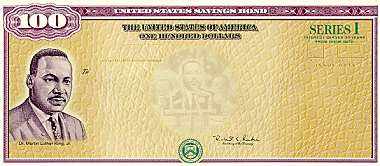 |
Helen Keller (1880-1968) lost her sight and hearing as a young child due to illness, but overcame these challenges and went on to become the twentieth century's best known advocate for people with disabilities. Through her writing, lectures, and work with various organizations, Keller focused public attention on issues affecting the handicapped. She was also successful in making Braille the standard for printed communication with the blind. She had a lifelong relationship with the American Foundation for the Blind, and was instrumental in the Lions Club International's devotion to the blind and blindness prevention. |
 |
This denomination is no longer available.
Dr. Hector P. Garcia (1914-1996) was a medical doctor who spent his life working to help the poor, sick, and neglected. Dr. Garcia served in World War II, received the Bronze Star Medal, and became a leading advocate for Mexican-American veterans' rights. He was an activist in the Latino civil rights movement and founder of the American G.I. Forum, an organization that addresses the health, education, and civil rights of Hispanic veterans. Dr. Garcia was the first Mexican-American to serve on the U.S. Commission on Civil Rights and served as U.S. Ambassador to the United Nations. He received our nation's highest civil honor, the Presidential Medal of Freedom, in 1984 from President Ronald Reagan. |
 |
Dr. Martin Luther King, Jr. (1929-1968), a Baptist minister from Atlanta, was one of the most prominent figures in the Civil Rights movement, which succeeded in achieving legal equality for African Americans. He co-founded and served as the first president of the Southern Christian Leadership Conference, organized to promote the advancement of integration and legal and social equality. Dr. King was the recipient of numerous awards, which recognized his outstanding work for non violent social change, including the Nobel Peace Prize in 1964. In 1986, Dr. King's birthday became a national holiday in recognition of his enormous contributions to American history. |
 |
Chief Joseph (1840-1904), a Native American leader, is best known for his principled resistance to the U.S. government's attempts to force the Nez Perce onto a reservation. An 1863 treaty took away their lands and forced the Nez Perce and their leader into a position of resistance. Though he consistently opposed war, when conflict became inevitable Chief Joseph and other leaders led the Nez Perce on a courageous retreat in 1877 for more than a thousand miles through Montana and Idaho. After a five-day siege only 30 miles from safety, he surrendered. In his final years, Chief Joseph spoke eloquently of the injustice of United States policy toward his people and held out hope that one-day freedom and equality might come for Native Americans. |
 |
George C. Marshall (1880-1959) was one of the most renowned military figures in United States history, serving as a General of the Army, Chief of Staff of the Army, Secretary of State and Secretary of Defense. He led U.S. military efforts to victory in World War II. Later, through the Marshall Plan, he built the foundation for the economic rehabilitation of Europe for which he received the Nobel Peace Prize in 1953- the first soldier to receive this honor. |
 |
With the special and general theories of relativity, Albert Einstein (1879-1955) replaced Newton's view of absolute time and absolute space with a new physics in which time slows down and gravity changes the shape of the universe. Albert Einstein is a symbol of the pursuit of truth through science that knows no national boundaries. As an immigrant to the United States, Einstein fled pre-war Germany and became a United States citizen. As a prize-winning physicist, Einstein replaced centuries of physics with a new and more complete view of the universe. As an international figure, Einstein fought for the cause of peace. He received the Nobel Prize for physics for his work on the photoelectric effect. |
 |
This denomination is no longer available.
Marian Anderson (1897-1993) was a world-renowned contralto with a vocal mastery from Bach and Schubert to Verdi and spirituals. In 1939, barred from singing at a concert hall in Washington, D.C., because of her race, Anderson was invited to sing on the steps of the Lincoln Memorial to a record crowd. Her long career started with singing in church as a young girl and took her to the pinnacle of the profession. In 1955, she became the first African American to sing with the Metropolitan Opera. Marian Anderson was loved and admired throughout the world as a great artist whose dignity in the face of discrimination opened doors for the many African-American artists now performing in concert halls and opera houses worldwide. |
 |
This denomination is no longer available.
Spark Matsunaga (1916-1990), a war hero who became a United States Senator from Hawaii, dedicated his career to promoting peace and achieving justice. A Japanese-American, Matsunaga served with distinction in the 100th Infantry Battalion, the first Japanese American unit formed during World War II, for which he received the Bronze Star Medal and two Purple Hearts. As a political leader, he was a champion of civil rights for all Americans regardless of race. As a member of the United States Senate, he worked to promote the peaceful resolution of conflicts, and he fought for redress for survivors of the World War II internment camps. |








